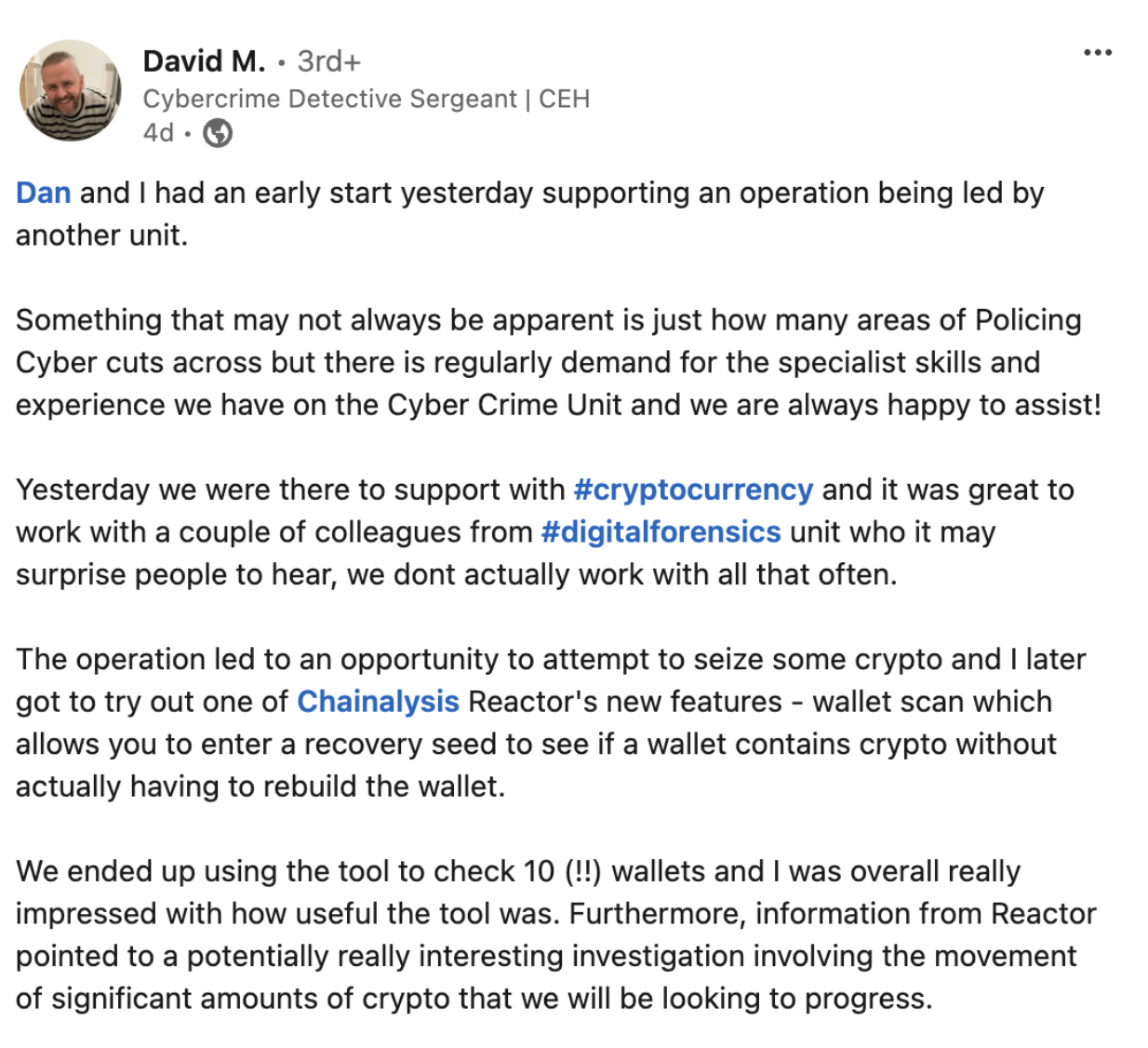In the high-stakes world of modern law enforcement, the ability to effectively seize cryptocurrency has become crucial. As digital currencies play an increasingly significant role in criminal activities, the stakes are higher than ever. Missing even a single address during a seizure can lead to substantial financial losses, allowing millions of dollars to slip into the hands of criminals.
This reality was highlighted in a July 2023 case involving the UK’s Crown Prosecution Service (CPS) and the Tarian Regional Organised Crime Unit (ROCU). Following the conviction of a hacker who had blackmailed victims for years, authorities employed a manual trial and error process to recover the seed phrase of a cryptocurrency wallet containing more than £750,000. This case demonstrated the power of advanced capabilities and legal frameworks in recovering substantial criminal assets, but also underscored the challenges law enforcement faces in this domain.
The dual challenge: Advancing legal frameworks while accelerating technological progress
Cryptocurrency asset seizures present unique challenges that law enforcement agencies worldwide must navigate. These challenges often result in missed opportunities where significant assets are overlooked, making it harder to solve crimes, stop bad actors, and bring justice to victims.
Addressing these challenges requires a combination of efforts to give law enforcement the ability to act, but also ensure they have the necessary knowledge and skills to act effectively.
Enforcement powers and regulatory frameworks
Without the necessary enforcement powers and regulatory frameworks, even the most well-equipped agencies are hindered in their ability to conduct thorough and timely analyses.
- Urgency: Investigators must quickly identify and seize assets controlled by malicious actors to prevent accomplices from moving the assets. The fast-paced nature of digital transactions means that even a slight delay can result in the permanent loss of valuable assets.
- Enforcement powers: Appropriate regulatory frameworks and inter-agency collaboration are essential to support swift and effective seizures. These frameworks must be robust enough to empower law enforcement agencies to act decisively and within the bounds of the law.
One country that has firmly committed to granting law enforcement the ability to address the problem is the UK, most notably through legislative updates to the Economic Crime and Corporate Transparency Act (ECCTA). Law enforcement can now seize crypto assets and crypto-related items (e.g. seed phrases and wallets, etc.) as part of investigations without arrest warrants, and apply new crypto asset freezing orders against crypto asset services, thus expanding their ability to act swiftly and decisively.
However, enforcement powers and regulatory frameworks are only one part of the story. Without a parallel focus on data, technology, and training, the ability to act is much less effective.
Data, technology, and training
Access to the right data, technology, and training enables law enforcement to effectively carry out their duties and overcome the complexities of modern cryptocurrency investigations.
- Complexity: Accurately assessing and identifying all potential seizable assets across multiple wallets and blockchains is extremely difficult. Each wallet and blockchain has its own intricacies, making it a daunting task for law enforcement to ensure no asset is overlooked.
- Data and technology: Having access to comprehensive data and advanced technologies is crucial. These resources enable law enforcement to conduct thorough investigations and reduce the risks of errors.
- Training: Adequate training is vital to equip law enforcement with the knowledge and skills needed to effectively leverage technology and data.
Technical challenges in identifying and seizing illicit assets
When it comes to seizing illicit crypto assets, the technical challenges can also be overwhelming. Seed phrases — typically composed of 12 or 24 words — serve as the keys to controlling a crypto wallet and the assets it stores. While it may seem straightforward to check these seed phrases for assets, doing so thoroughly demands expert knowledge and significant manual effort.
Key challenges include:
- Identifying associated wallets and assets: Determining which wallets a seed phrase controls can be complex. Was the seed generated from a Ledger hardware wallet, or perhaps Metamask? How much value is held in these wallets? Each has different nuances that need to be understood.
- Scanning multiple blockchains: A single seed phrase can control assets across multiple blockchains, like Tron or Bitcoin, making it difficult to identify all associated addresses and transactions. The sheer number of blockchains and the intricacies involved in each one can overwhelm even the most experienced investigators.
- Seizing and recovering assets: Even when assets are identified, legal and technical hurdles can still delay the process, sometimes until it’s too late. For instance, an accomplice might sweep a wallet clean before law enforcement can act. Traditional, manual methods are often inefficient and prone to errors, risking the success of an investigation and the recovery of funds for victims.
Law enforcement professionals openly acknowledge these challenges. Statements like “I’m not always checking seeds” and “I don’t know what I’m missing, but probably a lot” reflect the real-world difficulties they face. In a world where every second counts, these challenges can mean the difference between success and failure in an investigation.
Identifying seizable assets
At Chainalysis, we understand the challenges law enforcement faces in seizing crypto assets. That’s why we developed Wallet Scan, a transformative Labs capability that automates the process of identifying assets linked to seed phrases and addresses the technical challenges that have long hindered law enforcement agencies.

Key highlights:
- Seed phrase to public keys: Wallet Scan automates the conversion of seed phrases into public keys, identifying all associated wallets and balances across multiple blockchains. This automation significantly reduces the manual effort required, allowing investigators to focus on other critical aspects of the case.
- Offline processing: The process is conducted securely offline, ensuring complete security and evidential integrity. Seed phrases are never sent to Chainalysis.
- Comprehensive coverage: Wallet Scan conducts broad and deep scans across more than 15 blockchains, more than 35 popular wallets, and more than 50 million addresses for actionable leads. Other tools lack this comprehensiveness, making Wallet Scan the most advanced and robust capability available for law enforcement.
- Rapid results: Wallet Scan is highly efficient, producing results in minutes that can be directly integrated into graphs for seamless analysis and alerts. This speed ensures that investigators can act quickly, minimizing the risk of assets being moved or lost.
The effectiveness of Wallet Scan has already proven its value in real-world investigations. One of our early Wallet Scan beta users, Dave Browne from the UK’s Devon & Cornwall Police, shared that “Wallet Scan was able to identify over £10,000 worth of hidden crypto-assets, which were not identified or recovered during the trial, and despite the fact that those assets had been at rest within the wallet since 2017.”
A Cybercrime Detective Sergeant at the Cheshire Police recently recounted a similar experience:

Leading the way in crypto seizures for law enforcement
Although the challenges in effectively seizing cryptocurrency assets persist, they can be overcome with supportive frameworks, and the right knowledge and training. Chainalysis is at the forefront of providing the comprehensive solutions that law enforcement needs to navigate these challenges.
To learn more about how Wallet Scan is transforming asset recovery, and making complex seizures straightforward and secure, watch our on-demand webinar, “Simplifying Asset Seizures with Chainalysis Labs.”
We also have a new Asset Seizure Training Course designed for law enforcement, created by former officers experienced in crypto seizures. Participants will learn how to spot seizure opportunities, understand and identify crypto in forensic workflows, master technical details, and enhance legal readiness.
For more information or to see our solution in action, contact us today or request a demo to streamline your operations and confidently tackle the complexities of modern cryptocurrency investigations.
This website contains links to third-party sites that are not under the control of Chainalysis, Inc. or its affiliates (collectively “Chainalysis”). Access to such information does not imply association with, endorsement of, approval of, or recommendation by Chainalysis of the site or its operators, and Chainalysis is not responsible for the products, services, or other content hosted therein.
This material is for informational purposes only, and is not intended to provide legal, tax, financial, or investment advice. Recipients should consult their own advisors before making these types of decisions. Chainalysis has no responsibility or liability for any decision made or any other acts or omissions in connection with Recipient’s use of this material.
Chainalysis does not guarantee or warrant the accuracy, completeness, timeliness, suitability or validity of the information in this report and will not be responsible for any claim attributable to errors, omissions, or other inaccuracies of any part of such material.
